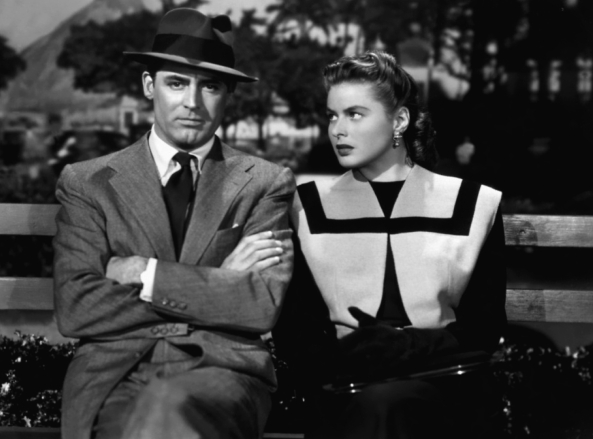I must sound like a broken record whenever I write about an Alfred Hitchcock movie and say it’s one of his best. “Notorious” took me two viewings to realize its greatness, and now I see it as a sharp-nosed film that combines romance and espionage on a razor thin blade. This isn’t like “To Catch a Thief,” where the only draw is the romance between Cary Grant and Grace Kelly and it happens to have a good suspense story and great cinematography worked in.
No, “Notorious” uses its romance as the driving force behind the spy thriller. Alicia Huberman (Ingrid Bergman) is enlisted by the American government to infiltrate the home of the German smuggler Alexander Sebastian (Claude Rains). However, Alicia is in love with her American contact, known only as Devlin (Cary Grant). Because Alexander suspects their infatuation, Alexander forces her to prove her loyalty to him through marriage. Because all three characters are emotionally involved and complex, we care little about the ramifications of Alexander’s misdeeds but how the events of the plot will affect their tortured love triangle.
It’s a romantic and yet gripping and even surreal film. “Notorious” is Hitchcock testing his limits as a story teller, a director capable of cinematic bravado and an artist evolving a new approach to suspense.
One of the film’s famous moments is a giant crane shot overlooking the luxurious foyer in the Sebastian home on the evening of a party. The camera moves opposite to the magnificent staircase and inches slowly to Alicia fiddling with a key hidden behind her back. Hitchcock here does in one shot, both setting the scene and revealing Alicia’s secret, what another director couldn’t dream of accomplishing.
This key opens up a wine cellar in Alex’s basement, and Hitch’s method to show us how Alex pieces together that the room has been tampered with could not be simpler. The years on the wine bottles were the dead giveaway, and it seems so obvious in retrospect, but again, how would another director have handled the same clue?
What I like best about the film however is its characters. It gets at the psychological complexities of these characters perhaps better than the other Hitchcock/Bergman movie “Spellbound.” In Grant, Bergman and Rains, you couldn’t ask for a better cast in a Hitchcock, and each of them is almost playing off type. Grant’s Devlin is as cold and repressed as any character he’s ever played. And although he’s usually the charmer, watch Bergman just turn him into putty in her hands when they first arrive in Rio de Janiero. Bergman has a sharp, seductive allure that shows just how compelling an actress she is, and yet her character is tormented and even self-deprecating.
Alicia’s drug trip late in the film seems like a precursor to the mind trip in “Vertigo,” and there are obvious parallels between this film and “Psycho” when we look at Alex and his strong bond with his mother. Leopoldine Konstantin loosely channels Mrs. Danvers in “Rebecca,” and we realize that although Alex is basically the movie’s villain, his inability to act on his own is so strong that we do not for a moment envy his position, least of all in his walk of death in the movie’s final shot.
So is “Notorious” Hitchcock at his finest? It’s the work of a master, and far better than even the best films of many other directors.

Great post!